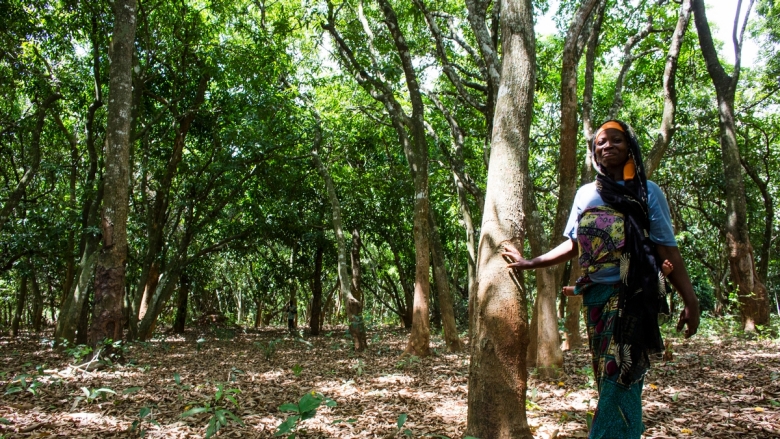Just six months after the landmark agreement for climate change was hammered out in Paris, country pioneers and thought leaders of results-based funding for tropical forest conservation met again in the very same city.
They were taking part in meetings from June 20 to 22 of the World Bank’s Forest Carbon Partnership Facility (FCPF), a global partnership of governments, businesses, civil society, and Indigenous Peoples focused on reducing emissions from deforestation and forest degradation, activities commonly referred to as REDD+.
For the first time, Costa Rica, a longtime pioneer in forest conservation, and the Democratic Republic of Congo (DRC), a champion of REDD+ and home to the second largest tropical forest in the world, presented their large-scale programs, which aim to reduce forest loss and to improve the livelihoods of indigenous peoples and local communities. With these programs, the two countries signaled their momentum to deliver on their national climate change commitments under the Paris Agreement (referred to as Nationally Determined Contributions).
“It is very important that REDD+ is understood as a mechanism that aims to contribute to attaining the ultimate goal of the Climate Convention,” said Costa Rican Minister of Environment and Energy, Dr. Edgar Gutiérrez, in a message to the meeting. “In 2006, we declared our intention to become carbon neutral by 2021. We recently renewed our commitment with the Paris Agreement. For many years, Costa Rica has promoted sustainable, green development; especially with regard to protecting natural resources, forests and environmental services.”
“The Mai Ndombe program is important for us. Our role in protecting forests is respected in the benefit sharing arrangements. It further puts a focus on land tenure in Mai Ndombe,” said Marie Dorothee Lisenga, of REPALEF, Network of Indigenous Peoples for the sustainable management of forest ecosystems in DRC. “We have been waiting for this.”
The $750 million fund rewards countries that have made progress on REDD+ through results-based payments for emission reductions. Conceived as a pilot for a potential global carbon market, the fund is designed to provide early lessons through testing a variety of approaches to transform rural livelihoods and landscapes. Large scale pilot programs center on policy and legal reforms for land management, improvements in land tenure, development and conservation investments.
Outside the forest community, the importance of forest conservation is often still underappreciated. Tropical forest loss contributes to 17 percent of total global greenhouse gas emissions and the combination of protecting and also restoring tropical forests offers up to one third of the global mitigation solution.
Keeping global temperatures in check is key to reducing poverty, as climate change and development are inextricably linked.
The ambitious program presented by the Democratic Republic of Congo aims to prove the concept of REDD+ based sustainable, low-carbon development to improve the lives of millions of people.
“We have high-level political leadership to steer DRC to sustainable green growth. In Mai-Ndombe we are implementing our national REDD+ strategy as a model for green development in the Congo Basin,” said Gentiny Ngobila, Governor of DRC’s Mai-Ndombe Province. “The program is implementing activities to address slash-and-burn agriculture, charcoal production, and logging as well as other drivers of deforestation. For this purpose, we are engaging a multitude of stakeholders across sectors and communities, including private sector, as well as civil society and indigenous peoples in a province twice the size of Costa Rica with forest cover comparable to Germany’s.”
“It is encouraging to see that countries are moving away from presenting sector-based proposals, and are instead thinking—and starting to act—along the lines of economy-wide policy reforms to realize their green growth development trajectories,” said Geeta Sethi, Manager, Strategy, Operations, and Forest and Landscapes, World Bank. “The green light for these programs is an important step in helping countries realize their national climate change mitigation commitments in the Paris Agreement. “The FCPF’s partnership is energized at the prospect of the important climate, environmental, economic, and social benefits that proposed landscape programs like these can generate. Yet, we are also mindful of the herculean task that countries face to turn their programs into reality.”
“The FCPF provides the first real opportunity to place a value on forest conservation, and sustainable development which can be scaled and replicated. By properly addressing drivers of deforestation, and creating innovative business models that reward sustainable agriculture, renewable energy and other key basic needs, we will have a better world,” said Paulo Bello, Private Sector Observer to the FCPF.
As more and more countries own the aspiration to place priority on the conservation and sustainable management of forests, on climate-smart agriculture, and on making transport, mining, and energy sectors forest-friendly, there is increasing optimism that the global community will achieve long-lasting positive change across rural landscapes and along the forest frontier—before it is too late.
And while the path toward a global carbon market for REDD+ at scale is yet to be determined, the two pioneering countries from Central Africa and Central America are leading the way to prove the concept of REDD+.

